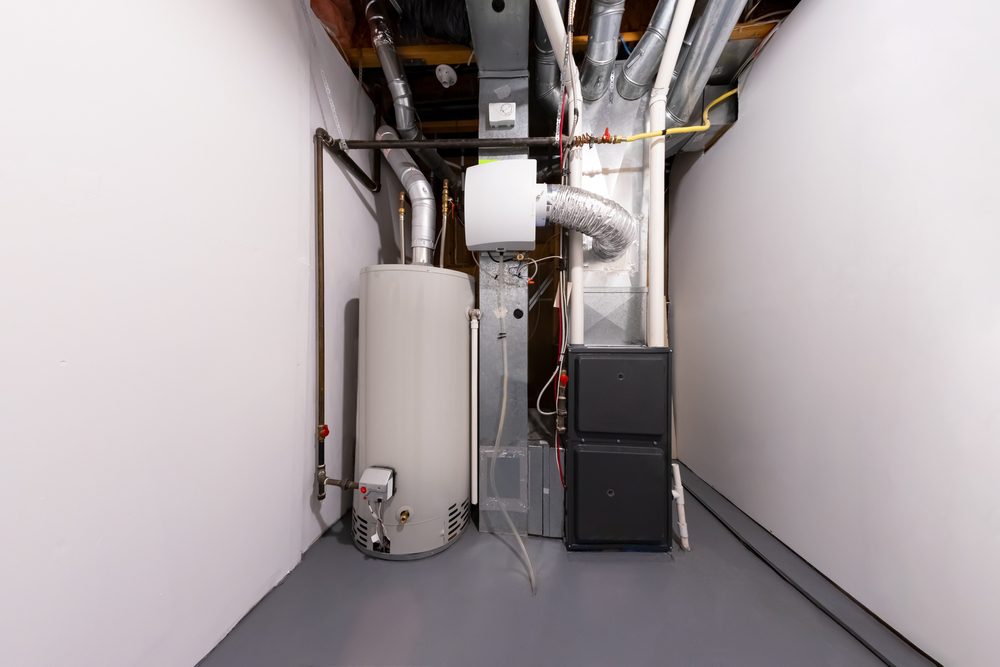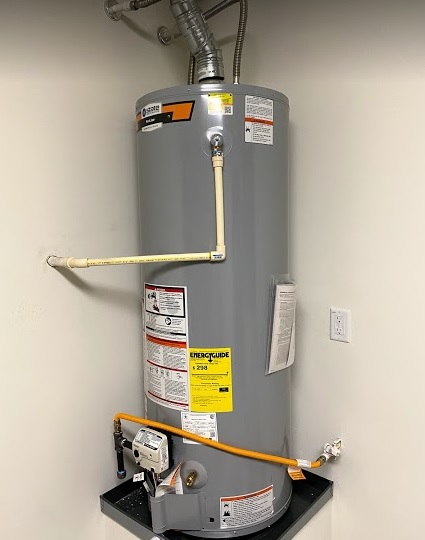A water heater clunking sound often indicates sediment buildup or a loose heating element. Ignoring it can lead to costly repairs.
A clunking sound from your water heater can be concerning. This noise usually means sediment has accumulated at the bottom of the tank, causing the heater to work harder. Over time, this sediment can lead to inefficiency and potential damage.
Addressing the issue early can save you from expensive repairs and extend the life of your heater. Regular maintenance, such as flushing the tank, can help prevent sediment buildup. If you hear clunking, it’s essential to act promptly. Ignoring the problem can result in more severe issues, including decreased performance and higher energy bills. Keep your water heater in top shape by addressing clunking sounds immediately.
Page Contents
Identifying The Clunking Sound
Common sources of the clunking sound include sediment build-up and loose parts. Sediment can collect at the bottom of the tank. This can cause loud noises when heating water. Loose parts inside the heater can also make clunking sounds. Regular maintenance can help reduce these issues.
The clunking sound usually occurs during the heating cycle. This happens when the water is being heated. The noise might also be louder when the heater is working harder. This can be during cold weather or when using a lot of hot water.
Sediment Buildup
Water contains minerals like calcium and magnesium. These minerals settle at the bottom of the water heater. Over time, they form sediment. The sediment hardens and creates clunking sounds when the heater is on. This noise can be loud and annoying.
Sediment buildup affects the heater’s efficiency. The heater needs more energy to heat water. This can increase your energy bills. Sediment also reduces the tank’s capacity. Less hot water is available for use. It can cause the heater to overheat, leading to damage. Regular maintenance can prevent these issues.
Mineral Deposits
Mineral deposits often cause a clunking sound in water heaters, signaling the need for maintenance. This buildup can decrease efficiency and shorten the appliance’s lifespan.
Hard Water Effects
Hard water has a lot of minerals. These minerals stick to the heater. The minerals make clunking sounds. The sounds are loud and annoying. Hard water makes heaters work harder. This uses more energy and costs more money. The heater can break faster with hard water. Cleaning the heater helps a lot.
Signs Of Mineral Buildup
There are many signs of mineral buildup. The water heater might make noise. Water might heat up slower. The water might look cloudy. The water could have a bad taste. The heater might not last long. Cleaning the heater can fix these problems.

Credit: www.snellheatingandair.com
Loose Components
Loose components in a water heater often cause clunking sounds, indicating potential issues. Addressing these noises promptly can prevent further damage and ensure efficient operation.
Internal Parts
Internal parts can become loose over time. This can cause a clunking sound in your water heater. Sediment buildup can also make the noise worse. Regular maintenance helps keep internal parts tight. A professional can check for loose bolts and other issues. Tightening loose parts can often stop the noise.
External Parts
External parts can also cause clunking sounds. Loose pipes are a common culprit. Check all the pipes attached to your water heater. Make sure they are secure and tight. Vibration can also cause external parts to become loose. Use brackets and clamps to hold parts firmly in place.
Water Pressure Issues
High water pressure can cause a clunking sound in your water heater. The extra pressure makes the heater work harder. Metal parts inside may expand and contract. This can create loud noises. It can also damage the heater over time. High pressure can even burst pipes.
Low water pressure can also be a problem. It makes it harder for the heater to work. Low pressure can lead to sediment buildup. Sediment can cause clunking sounds. It can also make the heater less efficient. Over time, low pressure can damage the heater too.

Credit: www.seacoastonline.com
Temperature Fluctuations
Temperature fluctuations often cause water heater clunking sounds. These noises signal potential issues that need immediate attention. Regular maintenance can prevent damage and ensure efficient operation.
Thermostat Problems
A broken thermostat can cause temperature fluctuations. This may lead to clunking sounds. The thermostat controls the water temperature. If it malfunctions, the water gets too hot or too cold. This makes the heater work harder. The extra strain causes noises. Replacing the thermostat can fix this issue.
Heating Element Issues
A faulty heating element can also cause clunking sounds. Over time, elements wear out. This leads to uneven heating. When the element heats unevenly, it causes clunking noises. Regular inspection can help spot this problem. Replacing the element solves the noise issue.
Flushing The Water Heater
A water heater clunking sound often indicates sediment buildup. Flushing the water heater can eliminate the noise and improve efficiency. Regular maintenance ensures a longer lifespan for your appliance.
Step-by-step Guide
First, turn off the heater. Next, connect a garden hose to the drain valve. Place the other end of the hose outside or in a drain. Open the drain valve and let the water flow out. Be careful; the water might be hot. Close the drain valve once the water stops.
Tools Needed
| Tool | Purpose |
|---|---|
| Garden Hose | Drain the water |
| Bucket | Catch water |
| Gloves | Protect hands |
| Wrench | Open valves |

Credit: alfaplumbingservices.com
Preventive Maintenance
Check your water heater every month. Look for signs of wear and tear. Small issues can become big problems. Listen for unusual sounds. Clunking sounds can mean trouble. Inspect the valves and pipes. Tighten any loose parts. Look for leaks around the base. Clean the area around your water heater. Dust and debris can cause problems. Check the temperature settings. The ideal setting is 120 degrees Fahrenheit. Regular inspections can prevent costly repairs.
Hire a professional to service your water heater yearly. They can spot hidden issues. Professionals have the right tools and knowledge. Regular servicing can extend the life of your heater. They can flush the tank to remove sediment. Sediment buildup can cause clunking sounds. A professional can check the anode rod. The anode rod prevents rust. Replacing it can save your tank. Regular professional servicing ensures your water heater runs smoothly.
When To Call A Professional
A clunking sound from your water heater signals potential issues. Contact a professional to avoid costly repairs and ensure safety. Ignoring unusual noises can lead to severe damage and inefficiency.
Signs Of Severe Issues
A clunking sound from your water heater can be alarming. Rusty water is a big warning sign. Water leaks around the unit need quick attention. High utility bills mean your heater works too hard. Inconsistent water temperature is another red flag. Strange noises like popping or banging should not be ignored.
Choosing A Technician
Find a licensed technician for your water heater. Check online reviews before making a choice. Ask friends and family for recommendations. Look for experience in fixing water heaters. Make sure the technician offers warranty on their work. Compare prices from different technicians. Always ask for a written estimate before starting any work.
Frequently Asked Questions
Why Is My Water Heater Making A Clunking Noise?
Your water heater might be making a clunking noise due to sediment buildup in the tank. This sediment causes the water to overheat, creating the noise. Flushing the tank can help resolve the issue. If the noise persists, consider contacting a professional plumber for further inspection and maintenance.
Why Does My Heater Make A Clunking Sound?
Your heater makes a clunking sound due to loose or worn-out parts, trapped air, or sediment buildup. Regular maintenance can help.
Should I Be Concerned About Water Heater Making A Noise?
Yes, you should be concerned. Noises from a water heater can indicate issues like sediment buildup, leaks, or malfunctioning parts. Regular maintenance helps.
Why Is My Water Heater Pinging?
Your water heater is pinging due to thermal expansion. This causes metal parts to contract and expand, creating noise. Flushing sediment build-up can help reduce the sound. Regular maintenance is essential.
Conclusion
Resolving the clunking sound in your water heater can prevent future damage. Regular maintenance is essential for efficient operation. Addressing issues early will save you from costly repairs. If you’re unsure, consult a professional. Ensure your water heater runs smoothly by staying proactive and attentive.
Your peace of mind and home comfort depend on it.
